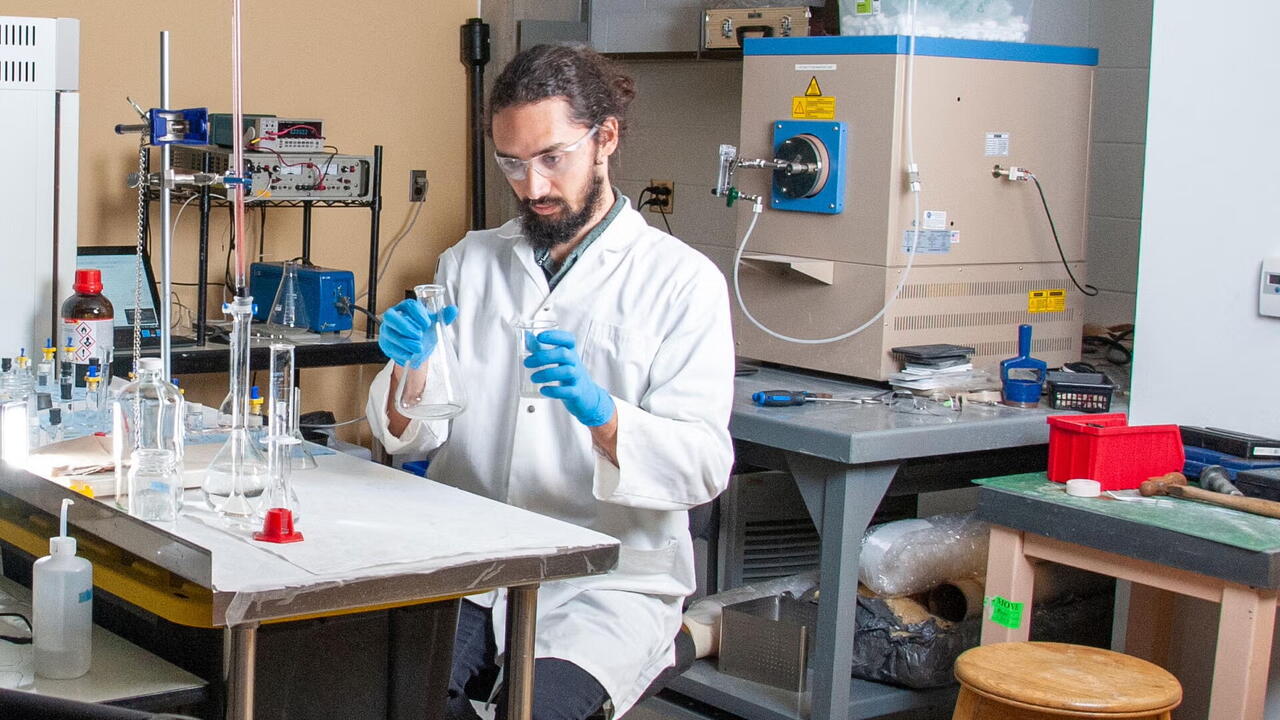
Turning saltwater into solar power
Waterloo alum Keith Cleland is changing the way industrial and commercial properties store energy sustainably with his startup's saltwater batteries

Waterloo alum Keith Cleland is changing the way industrial and commercial properties store energy sustainably with his startup's saltwater batteries
By University RelationsWaterloo researchers, students and alumni are leading innovations to solve the climate crisis by developing sustainable technologies today for the future, and Keith Cleland (MASc ’22) is no exception.
His passion for environmental sustainability and expertise in electrochemistry converged to launch Aqua-Cell Energy Inc. — a startup dedicated to designing affordable and safe energy storage solutions for commercial and industrial solar power.

Keith Cleland (MASc '22)
Alum, Faculty of Engineering
> Co-Founder, Aqua-Cell Energy
During his undergraduate studies, Cleland embarked on research to develop a battery that utilized saltwater for energy storage, which laid the foundation for his future endeavours.
In 2019, he joined the University of Waterloo as a master’s student under the supervision of Dr. Jeff Gostick in the Department of Chemical Engineering. It was while working in Gostick's Porous Materials Engineering and Analysis Lab that Cleland developed a prototype battery capable of storing solar energy and generating electricity.
Cleland and his co-founder Ellsworth Bell (MASc ’21) have one clear vision: contribute to cleaning the world by transitioning away from fossil fuels.
This vision secured the buy-in from Velocity — the centre for entrepreneurship at the University — where the company was nurtured through Venture Ready and won several pitch competitions.
As electricity demand increases due to the electrification of cars and future-focused technologies, Cleland explains that mass amounts of energy storage will be needed to support grid infrastructure for a stable, clean energy supply.
“With current options for energy storage like lithium batteries being too expensive for long-duration storage, Aqua-Cell Energy is everything lithium is not,” he says. “Our flow battery pumps saltwater through a battery stack where electricity is applied to store energy in the saltwater.”
He shares that when this process is run in reverse, it generates usable electricity.
“Our technology is the world’s most environmentally friendly battery storage option … and using low-cost saltwater as the electrolyte allows for affordable long duration energy storage of upwards of 12 hours.”
Designed to be the size of shipping containers, the company's saltwater batteries offer a cost-effective alternative to power industrial and commercial properties, addressing the critical issue of energy storage in the renewable energy industry.
Based in Edmonton, Alberta, Aqua-Cell Energy has a long-standing partnership with the Northen Alberta Institute of Technology that helps to scale up their pilot projects.
The company also recently secured $500,000 in grant funding from Alberta Innovates, the Ministry of Technology and Innovation and the Government of Alberta that will support building a battery that the company will deploy later this year for another pilot project with a utility company in the province.
As for what’s next, Cleland shares that as interest in the company’s saltwater batteries grow, funding to help scale the design and build is important. He hopes that after a few successful pilots — including the one currently being worked on — utility and other industrial companies will see the value in a more environmentally friendly, future-focused option that will allow the company to develop its batteries on a larger scale.

Read more
Discover how Waterloo alumni are driving Canada’s economy with five tech companies making a local and global impact

Read more
The University of Waterloo fosters innovation through bold, unconventional research, driving future-focused solutions to both local and global challenges

Read more
Student startup MetaCycler BioInnovations collaborates with Dairy Farmers of Ontario to scale their research solution for plastic pollution
The University of Waterloo acknowledges that much of our work takes place on the traditional territory of the Neutral, Anishinaabeg, and Haudenosaunee peoples. Our main campus is situated on the Haldimand Tract, the land granted to the Six Nations that includes six miles on each side of the Grand River. Our active work toward reconciliation takes place across our campuses through research, learning, teaching, and community building, and is co-ordinated within the Office of Indigenous Relations.